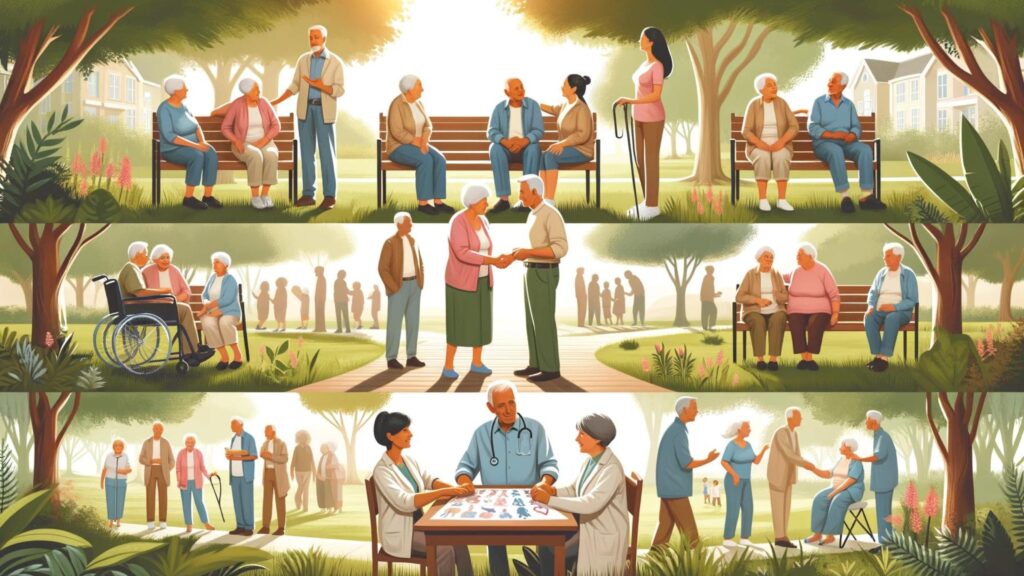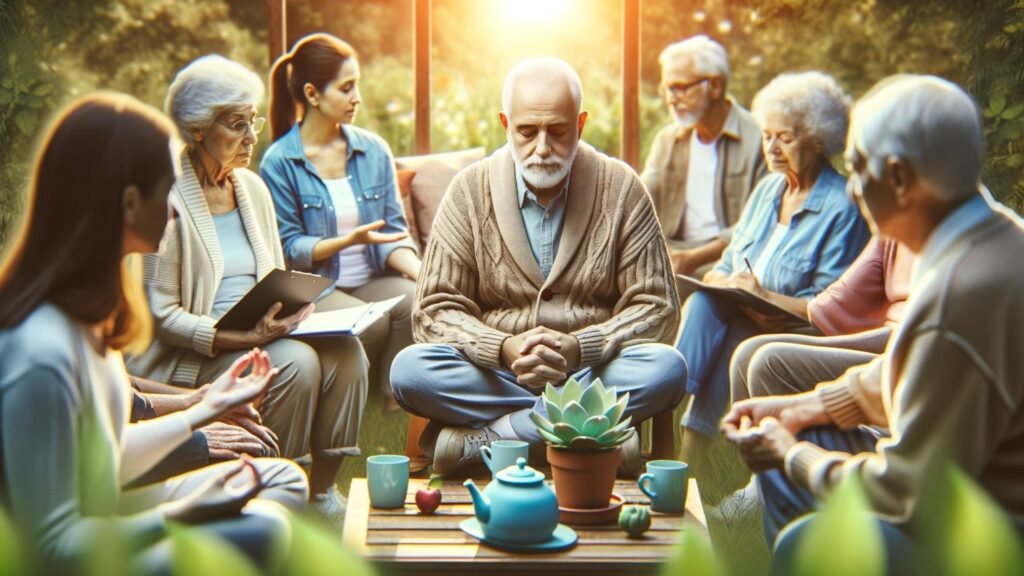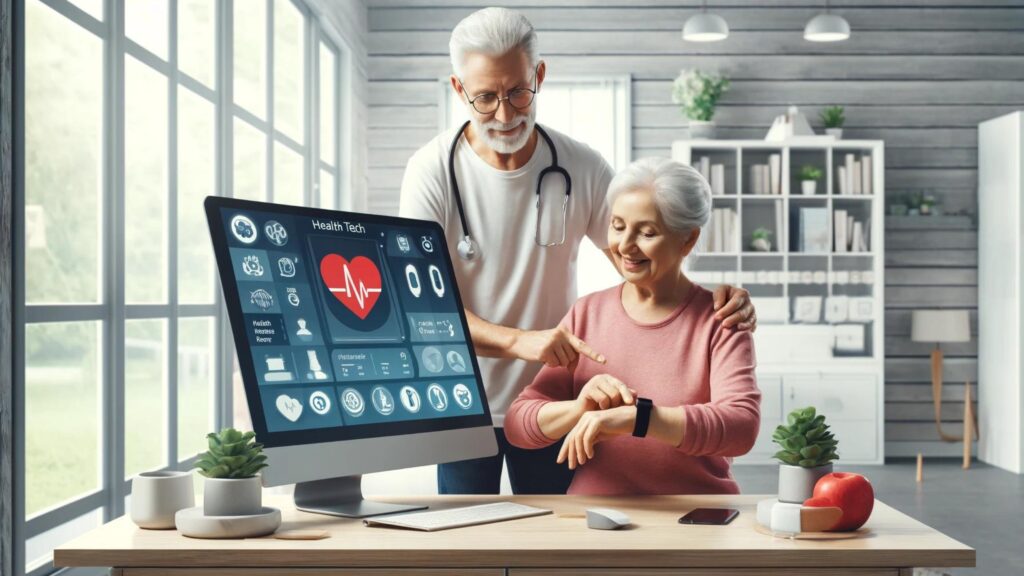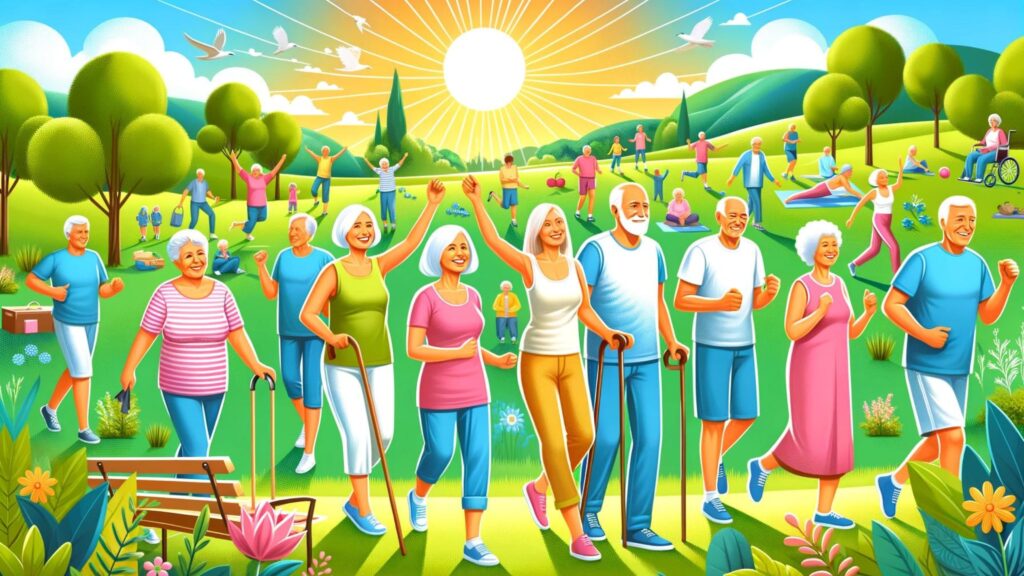Finding your way through the complex web of senior health care can be a life-changing experience. “Senior Health 101: The Ultimate Guide to Thriving at Any Age” is the most important book you can read to help you age with grace and energy. As people live longer, it’s important to understand the details of older health. This book goes into great detail about personalized tactics that make people live longer and better lives. Our perspective caters to individuals seeking to transform their golden years, from the latest health trends to established fitness routines. Let this light show you the way to a healthy and happy old age, where every day is full of possibilities and peace.
- The study focuses on the sexual health and relationships of older individuals.
- How your sexual health changes as you age
- How to Encourage Intimacy: Methods and Advantages
- Dealing with sexual health issues: assistance and treatment
- Tools for Senior Couples to Improve Their Communication
- The psychological impact of aging on sexual intimacy
- Seniors can learn about sexual health and attend workshops.
- Establishing new relationships as a senior can be challenging.
- What healthcare providers can do to help seniors with their sexual health
- Getting past barriers to sexuality in older adults
- For older people, safety and permission
- Health Affects Sexual Activity
- Helpful Links and Resources for Seniors' Sexual Health
- Seniors' mental health
- How to Find and Treat Mental Health Disorders That Start Late
- Personalized Treatment for Seniors with Depression and Anxiety
- Understanding the Unique Challenges of Schizophrenia for Seniors
- Brain-based therapies intended for older adults
- Support groups and services for mental health are available in the community.
- How family and caregivers can help with mental health
- The Effects of Being Alone on Seniors' Mental Health
- Bringing together primary care and mental health services
- Strategies for early detection and steps to prevent problems
- Handling Medications for Mental Health
- Using technology to make monitoring mental health better
- Campaigns to teach and raise awareness about senior mental health
- Senior Health Care: Giving Care
- Problems and Solutions for People Who Care for Seniors
- How to give seniors both care and freedom
- What caregivers can and can't do legally
- The emotional and physical well-being of those who provide care
- Caregivers can get training and find resources.
- Planning your budget for long-term care
- Why are caregiver support networks important?
- Technology Tools to Help Caregivers Take Care of Seniors
- Moving from home health care to assisted living
- Thoughts on the Ethics of Caring for Seniors
- Making choices about end-of-life care
- Creating a Good Environment for Caregiving
- Care at the end of life
- Learning about the different types of end-of-life care
- Hospice Care: Thoughts and Practices
- How to Select the Best Palliative Care Option
- End-of-life choices raise legal and moral issues.
- Family support and participation in end-of-life care
- Thoughts on Religion and Culture
- Addressing pain during the final stages of life
- Advanced Directives and Living Wills are ways to record your wishes.
- Help with grief and provide services for the bereaved.
- Thoughts on Quality of Life
- Public and private healthcare resources
- Teach seniors and their families about their dying choices.
- Healthcare Technology for Seniors
- The impact of wearable devices on senior health monitoring is significant.
- Telemedicine's Benefits for Seniors
- Innovations in Assistive Technology for the Elderly
- There are cybersecurity and privacy issues in senior health technology.
- preparing seniors to use health technology
- The use of AI is improving senior health care.
- We offer technology solutions for common senior health issues.
- Implementing technology in traditional senior care settings
- Smart Home and Senior Safety
- Accessibility of Technology in Senior Care
- Integrating health data for better results.
- Prospective Developments in Healthcare Technology for Senior Citizens
- Cultural and financial influences on seniors' health
- Cultural Sensitivity in Eldercare
- The senior years require financial planning for healthcare.
- Navigating Medicare and Medicaid
- How Economic Status Affects Healthcare Access
- Insurance Strategies for Seniors
- Cost of Senior Health Care: Reducing Burdens
- Government aid and private funding options
- Economic Factors Influencing Senior Health Choices
- Cultural Competence Training for Healthcare Professionals
- Estate planning and healthcare costs
- Financial abuse prevention for the elderly
- Community-Based Health Initiatives for Various Senior Populations
- Professional Step-by-Step Guide: Senior Health 101: The Ultimate Guide to Thriving at Any Age
- FAQs about Senior Health 101: The Ultimate Guide to Thriving at Any Age.
- Conclusion

The study focuses on the sexual health and relationships of older individuals.
How your sexual health changes as you age
When people get older, their bodies go through many changes, and their sexual health is no different. Changes in hormones, like lower amounts of testosterone and estrogen, can have a big effect on desire and sexual function. Understanding and adapting to these normal changes can ensure that seniors’ physical health remains a fulfilling aspect of their lives.
How to Encourage Intimacy: Methods and Advantages
Intimacy is an important part of human relationships that includes more than just physical contact. It also includes mental and emotional bonds. Spending valuable time together, talking to each other openly, and sharing hobbies are all things that can greatly improve closeness. Deep ties like these can improve your mental health and make you happier with your life, which shows how important it is to build close relationships in your older years.
Dealing with sexual health issues: assistance and treatment
Many older people have problems with their sexual health, like not being able to get an erection or having dry vaginal areas, which can make it hard to be intimate. Thankfully, there are a lot of effective ways to deal with these problems, ranging from pharmaceutical solutions to physical exercises. To handle these situations with ease, it’s important to have access to caring medical workers who are willing to listen and help.
Tools for Senior Couples to Improve Their Communication
Good conversation is the key to a happy relationship, but it’s especially important for older couples who are going through changes in their sexual relationship. Couples therapy, communication classes, and guided talks are all tools that can help partners be honest about their wants, fears, and needs, which can improve their relationship.
The psychological impact of aging on sexual intimacy
Concerns about body image and worries about sexual ability can get in the way of sexual closeness as you get older. Seniors can keep a healthy sexual identity and enjoy closeness without too much stress by getting help for these problems and learning to accept themselves.
Seniors can learn about sexual health and attend workshops.
Workshops that teach about sexual health for seniors can help people understand the changes that come with getting older and give them useful tips for staying sexually healthy. A lot of the time, these meetings talk about safe sex, increasing sexual happiness, and dealing with sexual changes caused by health issues.
Establishing new relationships as a senior can be challenging.
For seniors, starting a new relationship can be both exciting and scary. Being honest about what you want and your physical health, as well as going at your own pace, can help adults build strong, satisfying relationships as they get older.
What healthcare providers can do to help seniors with their sexual health
Healthcare providers are critical for senior sexual health because they can provide seniors with personalized assistance, treatment options, and ongoing support. Their advice is very helpful for adults who want to handle the complicated issues of sexual health in a private and secure way.
Getting past barriers to sexuality in older adults
Even though people are becoming more aware of the issue, there are still negative views about sexuality among older adults that keep them feeling ashamed and alone. Fighting these stereotypes by educating the community and pushing for open conversations about senior sexual health are important steps toward accepting sexuality as a normal part of life.
For older people, safety and permission
No matter what age you are, safety and permission are the most important things in any sexual interaction. Seniors, particularly those in new relationships or residing in assisted living homes, must understand consent and safe sex practices to ensure the protection of their rights and health.
Health Affects Sexual Activity
Physical health directly influences the sexual behavior of seniors. Conditions like arthritis and diabetes can make closeness more difficult. Seniors can still have a busy and happy sex life if they change their sexual practices to fit their health needs.
Helpful Links and Resources for Seniors’ Sexual Health
There are a lot of tools and support networks out there to help adults with their sexual health. There are internet platforms, specialized healthcare providers, and neighborhood groups, all of which are committed to giving seniors the support and knowledge they need to live sexually healthy lives.

Seniors’ mental health
How to Find and Treat Mental Health Disorders That Start Late
Late-onset mental health issues can have a big effect on adults and often make their other health problems worse. Early detection and treatment that fit each person are very important. To do this, doctors have to look for signs that might not have been there earlier in life and make care plans that are specific to the physical and mental needs of older people.
Personalized Treatment for Seniors with Depression and Anxiety
Adults with depression or anxiety require treatments tailored to their specific needs. This includes thinking about how getting older affects the mind and body, and maybe changing medicines and adding treatments that help with cognitive loss, physical health problems, and social isolation that are common in older people.
Understanding the Unique Challenges of Schizophrenia for Seniors
When identified in seniors, schizophrenia can cause unique problems that often require specialized care methods. It’s important to understand these problems, like how schizophrenia can combine with age-related diseases and how late detection can affect quality of life.
Brain-based therapies intended for older adults
Cognitive treatments for adults focus on improving general mental health, addressing mood problems, and enhancing cognitive function to meet the unique needs of the aging brain. Some techniques could be mental exercises, jobs that help you solve problems, and treatments that help you control your emotions.
Support groups and services for mental health are available in the community.
Community mental health programs and support groups are very important for providing seniors with social support and tools. These groups give older people a place to talk about their experiences, reduce shame, and get more involved in their own mental health care.
How family and caregivers can help with mental health
Family and caregivers are often the ones who take the lead in handling seniors’ mental health by giving them daily support and making sure they receive the same care over time. As part of their job, they must monitor changes in mental health, assist individuals in scheduling medical visits, and provide social support.
The Effects of Being Alone on Seniors’ Mental Health
Isolation from other people can have a big effect on the mental health of seniors, making them more likely to develop illnesses like sadness and anxiety. Getting adults involved in their communities and using technology can help them feel less alone, encouraging them to live a more connected life.
Bringing together primary care and mental health services
Integrating mental health services into basic care for seniors ensures comprehensive health care, as mental health has become a standard component of regular check-ups. This combination makes it easier to find mental health problems early and gives you a better way to treat them.
Strategies for early detection and steps to prevent problems
The key to controlling the mental health of seniors is taking preventative steps and finding problems early on. This includes regular mental health checks, public health programs that educate adults and caregivers, and changes to the way people live that are good for mental health.
Handling Medications for Mental Health
Seniors with mental health problems need to be able to handle their medications well in order to get better. This involves selecting appropriate medications, managing dosages, and monitoring side effects to minimize their impact on overall health and prevent drug interactions.
Using technology to make monitoring mental health better
A few of the innovative and creative ways that technology can help and monitor the mental health of seniors include apps that track mood and mental health signs and telepsychiatry services that provide guidance and support from a distance.
Campaigns to teach and raise awareness about senior mental health
To help people learn more about mental health problems in seniors, education and information efforts are very important. These efforts can help take the mystery out of mental health problems, encourage adults to seek help, and build a community where everyone is willing to help.

Senior Health Care: Giving Care
Problems and Solutions for People Who Care for Seniors
Caring for adults comes with its own set of problems, like dealing with their long-term illnesses and mental needs. Some good tactics include learning about unique health problems, learning how to manage your time well while caring for someone, and using community tools to provide full care.
How to give seniors both care and freedom
It is important to find a balance between giving care and letting the senior stay independent. This means giving them as many choices as possible, using flexible tools to make daily tasks easier, and getting them involved in decision-making about their care plans.
What caregivers can and can’t do legally
Legally, caregivers have certain rights and duties that they need to know about. Some of these are the right to work in a safe place, the duty to provide care that is legal and moral, and the ability to understand privacy laws that apply to health information.
The emotional and physical well-being of those who provide care
Caregivers’ mental and physical health is very important for long-term care. Caregivers must take breaks, join support groups, and prioritize their own health to prevent burnout.
Caregivers can get training and find resources.
There are a lot of training programs and tools out there to help parents do their jobs better. Some of these tools are classes on how to care for older people, guides on medical jobs, and access to professional support networks.
Planning your budget for long-term care
Long-term care necessitates careful financial planning to ensure that there are enough funds to cover all aspects of care. It could mean learning about your health benefits, looking into government help, and making plans for when you might need long-term care.
Why are caregiver support networks important?
Support networks for caregivers are very important because they offer emotional, educational, and sometimes cash help. Caregivers can share experiences, tips, and tools through these networks, which can help them feel less alone.
Technology Tools to Help Caregivers Take Care of Seniors
Tools like apps for managing medications, emergency alert systems, and internet health records can make caring a lot easier. These tools make it easier to care for adults and make sure they are safe and healthy.
Moving from home health care to assisted living
Moving from home care to assisted living can be hard for both adults and the people who care for them. Careful planning, open communication of the change’s reasons, and consideration of the senior’s wants and needs are essential.
Thoughts on the Ethics of Caring for Seniors
When caring for seniors, it’s important to protect their privacy, get their permission before doing any medical treatments, and be kind and follow the law when dealing with sensitive situations like end-of-life care.
Making choices about end-of-life care
Making choices about end-of-life care is one of the hardest parts of caring for an elderly person. When talking to a senior, it’s important to be sensitive and follow their wishes, and it’s even better if they can help plan as much as possible.
Creating a Good Environment for Caregiving
To make a good nursing setting, you need to do more than just meet the seniors’ physical needs. You also need to create a caring space that supports their mental and social health. You can achieve this by fostering effective communication, creating a comfortable living space, and encouraging individuals to engage in conversation.
- The study focuses on the sexual health and relationships of older individuals.
- How your sexual health changes as you age
- How to Encourage Intimacy: Methods and Advantages
- Dealing with sexual health issues: assistance and treatment
- Tools for Senior Couples to Improve Their Communication
- The psychological impact of aging on sexual intimacy
- Seniors can learn about sexual health and attend workshops.
- Establishing new relationships as a senior can be challenging.
- What healthcare providers can do to help seniors with their sexual health
- Getting past barriers to sexuality in older adults
- For older people, safety and permission
- Health Affects Sexual Activity
- Helpful Links and Resources for Seniors' Sexual Health
- Seniors' mental health
- How to Find and Treat Mental Health Disorders That Start Late
- Personalized Treatment for Seniors with Depression and Anxiety
- Understanding the Unique Challenges of Schizophrenia for Seniors
- Brain-based therapies intended for older adults
- Support groups and services for mental health are available in the community.
- How family and caregivers can help with mental health
- The Effects of Being Alone on Seniors' Mental Health
- Bringing together primary care and mental health services
- Strategies for early detection and steps to prevent problems
- Handling Medications for Mental Health
- Using technology to make monitoring mental health better
- Campaigns to teach and raise awareness about senior mental health
- Senior Health Care: Giving Care
- Problems and Solutions for People Who Care for Seniors
- How to give seniors both care and freedom
- What caregivers can and can't do legally
- The emotional and physical well-being of those who provide care
- Caregivers can get training and find resources.
- Planning your budget for long-term care
- Why are caregiver support networks important?
- Technology Tools to Help Caregivers Take Care of Seniors
- Moving from home health care to assisted living
- Thoughts on the Ethics of Caring for Seniors
- Making choices about end-of-life care
- Creating a Good Environment for Caregiving
- Care at the end of life
- Learning about the different types of end-of-life care
- Hospice Care: Thoughts and Practices
- How to Select the Best Palliative Care Option
- End-of-life choices raise legal and moral issues.
- Family support and participation in end-of-life care
- Thoughts on Religion and Culture
- Addressing pain during the final stages of life
- Advanced Directives and Living Wills are ways to record your wishes.
- Help with grief and provide services for the bereaved.
- Thoughts on Quality of Life
- Public and private healthcare resources
- Teach seniors and their families about their dying choices.
- Healthcare Technology for Seniors
- The impact of wearable devices on senior health monitoring is significant.
- Telemedicine's Benefits for Seniors
- Innovations in Assistive Technology for the Elderly
- There are cybersecurity and privacy issues in senior health technology.
- preparing seniors to use health technology
- The use of AI is improving senior health care.
- We offer technology solutions for common senior health issues.
- Implementing technology in traditional senior care settings
- Smart Home and Senior Safety
- Accessibility of Technology in Senior Care
- Integrating health data for better results.
- Prospective Developments in Healthcare Technology for Senior Citizens
- Cultural and financial influences on seniors' health
- Cultural Sensitivity in Eldercare
- The senior years require financial planning for healthcare.
- Navigating Medicare and Medicaid
- How Economic Status Affects Healthcare Access
- Insurance Strategies for Seniors
- Cost of Senior Health Care: Reducing Burdens
- Government aid and private funding options
- Economic Factors Influencing Senior Health Choices
- Cultural Competence Training for Healthcare Professionals
- Estate planning and healthcare costs
- Financial abuse prevention for the elderly
- Community-Based Health Initiatives for Various Senior Populations
- Professional Step-by-Step Guide: Senior Health 101: The Ultimate Guide to Thriving at Any Age
- FAQs about Senior Health 101: The Ultimate Guide to Thriving at Any Age.
- Conclusion

Care at the end of life
Learning about the different types of end-of-life care
There are different ways to get end-of-life care, and each one is based on what the patient wants and needs. Knowing about these choices—like hospice care, palliative care, and at-home care—is important for making decisions that value the person’s humanity as they near the end of their life.
Hospice Care: Thoughts and Practices
Hospice care focuses on comforting people who are nearing the end of their lives with a serious disease rather than curing them. This part would talk about the concept behind hospice care as well as the actual parts, such as the services that are available and the criteria for being eligible.
How to Select the Best Palliative Care Option
The goal of palliative care is to ease the patient’s symptoms and make their quality of life better without trying to fix the sickness. In hospice care, figuring out what options are available means learning about the different ways to treat pain and other symptoms and incorporating them into the patient’s care plan.
End-of-life choices raise legal and moral issues.
Important moral and legal issues, such as the patient’s right to reject treatment, their liberty, and their permission, surround end-of-life care. This subject talks about the rules and frameworks that make these choices possible, making sure they are honest and in line with what the patient wants.
Family support and participation in end-of-life care
Family plays a crucial role in end-of-life care by providing mental support and ensuring the execution of the patient’s wishes. This part talks about ways for family members to talk to each other, the roles they can play, and how they can work with healthcare workers to make a care team that supports each other.
Thoughts on Religion and Culture
Beliefs about culture and religion play a big role in choices about end-of-life care. This topic talks about the need for care that is sensitive to different cultures and habits. This will help the patient and their family feel better during this difficult time.
Addressing pain during the final stages of life
To make people feel better and maintain their quality of life, end-of-life care must include effective pain control. This part talks about different ways to deal with pain, such as medicine, non-drug methods, and custom plans made just for each patient.
Advanced Directives and Living Wills are ways to record your wishes.
Advanced directives and living wills are important parts of end-of-life planning because they let people say ahead of time what kind of medical care they want. This article discusses the significance of these documents, their creation, and their role in ensuring the execution of the patient’s wishes.
Help with grief and provide services for the bereaved.
Grief therapy and grief programs are very helpful for families and guardians who have lost a loved one. This part talks about whether these services are available, how important they are for helping people deal with sadness, and how to get help.
Thoughts on Quality of Life
When someone is nearing the end of their life, the goal of end-of-life care is to make sure they are comfortable and treated with respect. This subject is about figuring out and improving quality of life by using all-around care methods that take into account physical, mental, and spiritual requirements.
Public and private healthcare resources
The information in this part gives an outline of the public and private tools that can help with end-of-life care. It explains how to access these services, what types of assistance are available, and how to navigate complex care systems.
Teach seniors and their families about their dying choices.
Education is crucial for seniors and their families to make informed decisions about end-of-life care. This section discusses training programs, tools, and classes that provide families with useful information about the choices and services available, ensuring that they are prepared to make these decisions.

Healthcare Technology for Seniors
The impact of wearable devices on senior health monitoring is significant.
Wearable technologies have transformed the way elders monitor their health, delivering real-time information on heart rate, sleep habits, and physical activity. This technology enables elders to take proactive measures to manage their health and well-being.
Telemedicine’s Benefits for Seniors
Telemedicine provides elders with easy access to healthcare specialists from the comfort of their own homes, decreasing the need for travel and waiting periods. This accessibility is particularly advantageous to people who have mobility issues or live in distant places.
Innovations in Assistive Technology for the Elderly
Robotic mobility aids, upgraded hearing aids, and voice-activated home systems are examples of modern assistive technology for the elderly. These improvements considerably increase seniors’ quality of life and independence.
There are cybersecurity and privacy issues in senior health technology.
As more seniors utilize health technology, the significance of cybersecurity and privacy protection grows. Protecting sensitive health data from breaches is critical to preserving confidence and safety in technology usage.
preparing seniors to use health technology
To utilize health technology properly, elders must get proper training. Educational seminars and workshops may help seniors become more comfortable and adept with new technologies, increasing their engagement and advantages.
The use of AI is improving senior health care.
Artificial intelligence (AI) is crucial to improving elder health care by forecasting health trends, customizing care plans, and automating repetitive chores. AI technology may improve health outcomes and make healthcare methods more efficient.
We offer technology solutions for common senior health issues.
Technology provides answers to typical senior health challenges, such as prescription management applications, appointment reminders, and virtual therapy sessions. These instruments aid in the management of chronic illnesses and the preservation of mental health.
Implementing technology in traditional senior care settings
Integrating contemporary technology into conventional elder care facilities, such as nursing homes and community centers, may improve both care quality and efficiency. This involves implementing electronic health records and monitoring technologies to enhance care coordination.
Smart Home and Senior Safety
Fall detection, automated lighting, and emergency response systems are all examples of smart home technology features that may dramatically improve elder safety. These technologies enable elders to live freely and safely.
Accessibility of Technology in Senior Care
We must design user-friendly interfaces and equipment that accommodates physical restrictions to ensure technological accessibility in elder healthcare. Accessibility enhances usefulness and promotes widespread acceptance among elders.
Integrating health data for better results.
Integrating health data from several sources, such as wearable devices and electronic health records, gives a full picture of a senior’s health. This integration enables more accurate diagnosis and individualized treatment approaches.
Prospective Developments in Healthcare Technology for Senior Citizens
The future of health technology for seniors is bright, with breakthroughs in biotechnology, nanotechnology, and robots projected to improve treatment. These changes have the potential to revolutionize the landscape of senior healthcare, providing even more support and capacity for aging populations.

Cultural and financial influences on seniors’ health
Cultural Sensitivity in Eldercare
Understanding and respecting cultural differences is critical to delivering appropriate care for the elderly. This section will look at how healthcare practitioners might use culturally sensitive approaches to improve communication and treatment results for a varied geriatric population.
The senior years require financial planning for healthcare.
As people get older, financial planning becomes more important for controlling healthcare expenditures. This issue discusses budgeting tactics, selecting the correct insurance coverage, and planning for unforeseen health-related costs in the senior years.
Navigating Medicare and Medicaid
For many seniors, knowing and negotiating Medicare and Medicaid is critical. This section discusses the distinctions between various plans, eligibility requirements, coverage alternatives, and how to maximize benefits to lower out-of-pocket healthcare expenditures.
How Economic Status Affects Healthcare Access
Economic position has a considerable influence on access to decent healthcare. This topic focuses on how seniors’ socioeconomic level limits their healthcare choices and explores strategies to expand access across socioeconomic categories.
Insurance Strategies for Seniors
Choosing the correct insurance plan is critical for controlling healthcare expenditures in later life. This section discusses the numerous forms of health insurance accessible to seniors, including supplementary coverage to bridge gaps in Medicare or Medicaid.
Cost of Senior Health Care: Reducing Burdens
With growing healthcare expenses, seniors need to find strategies to decrease their financial obligations. This section provides practical advice on lowering out-of-pocket costs via careful preparation and various healthcare programs.
Government aid and private funding options
Exploring various financing options available through government and commercial sources may help seniors manage their healthcare bills more efficiently. This page explains how to access and use these resources.
Economic Factors Influencing Senior Health Choices
Economic issues frequently influence the healthcare options accessible to seniors. This section investigates how financial constraints affect choices about healthcare services, treatments, and providers.
Cultural Competence Training for Healthcare Professionals
Cultural competency training for healthcare personnel is critical to providing courteous and effective treatment. This training allows physicians to better understand and accommodate the cultural demands and preferences of their senior patients.
Estate planning and healthcare costs
Estate planning is more than just asset distribution; it also includes preparing for healthcare bills. This article explores how seniors should include healthcare expenditures in their estate plans to maintain financial stability and peace of mind.
Financial abuse prevention for the elderly
Financial abuse is a major problem among the elderly. This section offers strategies for identifying, preventing, and addressing financial abuse, thereby safeguarding elders from exploitation.
Community-Based Health Initiatives for Various Senior Populations
Community-based health programs are critical to delivering accessible and specialized healthcare services to elders from various backgrounds. This section discusses effective initiatives and how they address the distinct health requirements of diverse ethnic groups.
- The study focuses on the sexual health and relationships of older individuals.
- How your sexual health changes as you age
- How to Encourage Intimacy: Methods and Advantages
- Dealing with sexual health issues: assistance and treatment
- Tools for Senior Couples to Improve Their Communication
- The psychological impact of aging on sexual intimacy
- Seniors can learn about sexual health and attend workshops.
- Establishing new relationships as a senior can be challenging.
- What healthcare providers can do to help seniors with their sexual health
- Getting past barriers to sexuality in older adults
- For older people, safety and permission
- Health Affects Sexual Activity
- Helpful Links and Resources for Seniors' Sexual Health
- Seniors' mental health
- How to Find and Treat Mental Health Disorders That Start Late
- Personalized Treatment for Seniors with Depression and Anxiety
- Understanding the Unique Challenges of Schizophrenia for Seniors
- Brain-based therapies intended for older adults
- Support groups and services for mental health are available in the community.
- How family and caregivers can help with mental health
- The Effects of Being Alone on Seniors' Mental Health
- Bringing together primary care and mental health services
- Strategies for early detection and steps to prevent problems
- Handling Medications for Mental Health
- Using technology to make monitoring mental health better
- Campaigns to teach and raise awareness about senior mental health
- Senior Health Care: Giving Care
- Problems and Solutions for People Who Care for Seniors
- How to give seniors both care and freedom
- What caregivers can and can't do legally
- The emotional and physical well-being of those who provide care
- Caregivers can get training and find resources.
- Planning your budget for long-term care
- Why are caregiver support networks important?
- Technology Tools to Help Caregivers Take Care of Seniors
- Moving from home health care to assisted living
- Thoughts on the Ethics of Caring for Seniors
- Making choices about end-of-life care
- Creating a Good Environment for Caregiving
- Care at the end of life
- Learning about the different types of end-of-life care
- Hospice Care: Thoughts and Practices
- How to Select the Best Palliative Care Option
- End-of-life choices raise legal and moral issues.
- Family support and participation in end-of-life care
- Thoughts on Religion and Culture
- Addressing pain during the final stages of life
- Advanced Directives and Living Wills are ways to record your wishes.
- Help with grief and provide services for the bereaved.
- Thoughts on Quality of Life
- Public and private healthcare resources
- Teach seniors and their families about their dying choices.
- Healthcare Technology for Seniors
- The impact of wearable devices on senior health monitoring is significant.
- Telemedicine's Benefits for Seniors
- Innovations in Assistive Technology for the Elderly
- There are cybersecurity and privacy issues in senior health technology.
- preparing seniors to use health technology
- The use of AI is improving senior health care.
- We offer technology solutions for common senior health issues.
- Implementing technology in traditional senior care settings
- Smart Home and Senior Safety
- Accessibility of Technology in Senior Care
- Integrating health data for better results.
- Prospective Developments in Healthcare Technology for Senior Citizens
- Cultural and financial influences on seniors' health
- Cultural Sensitivity in Eldercare
- The senior years require financial planning for healthcare.
- Navigating Medicare and Medicaid
- How Economic Status Affects Healthcare Access
- Insurance Strategies for Seniors
- Cost of Senior Health Care: Reducing Burdens
- Government aid and private funding options
- Economic Factors Influencing Senior Health Choices
- Cultural Competence Training for Healthcare Professionals
- Estate planning and healthcare costs
- Financial abuse prevention for the elderly
- Community-Based Health Initiatives for Various Senior Populations
- Professional Step-by-Step Guide: Senior Health 101: The Ultimate Guide to Thriving at Any Age
- FAQs about Senior Health 101: The Ultimate Guide to Thriving at Any Age.
- Conclusion
Professional Step-by-Step Guide: Senior Health 101: The Ultimate Guide to Thriving at Any Age
Step 1: Understanding Senior Health Fundamentals
Objective: Develop a basic grasp of what characterizes senior health.
Action: Conduct research and assemble data on the most frequent health issues among seniors, such as heart health, diabetes, and arthritis. Use reliable sources, such as the National Institute on Aging or the World Health Organization.
Step 2: Assessing Individual Health Needs
Objective: Assess your present health state or that of the senior you care for.
Action: Schedule a full health checkup with a geriatric expert to detect any unique health concerns or hazards. Discuss any current ailments and how they may affect your daily life and long-term health.
Step 3: Create a personalized health plan.
Objective: Create a customized health plan that meets unique requirements.
Action: Based on medical advice, develop a strategy that includes food recommendations, an exercise routine, and, if necessary, medication management. Make sure the strategy is adaptive to changes in health conditions.
Step 4: Engage in regular physical activity.
Objective: Incorporate physical exercise into your daily routine to improve mobility and general health.
Choose activities suitable for the senior’s skill level, such as walking, swimming, or moderate yoga. If needed, consult a physical therapist to design safe and useful workouts.
Step 5: Manage your diet and nutrition.
Goal: Maintain a balanced diet that promotes health and wellbeing.
Action: Plan meals that are high in key nutrients, low in processed sugars, and suitable for managing any health concerns, such as hypertension and diabetes. Consult a dietician to tailor your nutritional requirements to your individual needs.
Step 6: Staying mentally active
Objective: To maintain cognitive function and mental wellbeing.
Engage in mentally stimulating hobbies such as puzzles, reading, or learning a new skill. Consider applications meant to improve cognitive activity for elders.
Step 7: Creating and Maintaining Social Connections
Goal: To prevent social isolation and develop meaningful interactions.
Encourage engagement in neighborhood organizations, online forums for seniors, and social clubs that provide activities and conversation.
Step 8: Utilize technology for health monitoring.
Objective: Use technology to measure health parameters and ease healthcare administration.
To improve access to healthcare experts, use health monitoring applications, devices that monitor vital signs, and telemedicine services.
Step 9: Regular health check-ups and screenings
Preventive care may help you stay ahead of future health risks.
Action: Schedule frequent examinations for eyesight, hearing, bone density, and other important health issues. Ensure that vaccines are up-to-date, and follow your doctor’s recommendations for any specific screenings.
Step 10: Planning for healthcare costs
Objective: Create a financial plan for aging and healthcare expenses.
Action: Look into insurance choices, government assistance, and retirement savings programs to help meet projected and unexpected healthcare costs. Consult a financial planner who specializes in elder care.
Step 11: Understanding Legal and Ethical Issues
Objective: Handle all legal and ethical issues related to elder care.
Action: Prepare or amend crucial papers such as wills, advanced directives, and powers of attorney. Educate yourself and your family members on these issues so that all choices respect the senior’s desires.
FAQs about Senior Health 101: The Ultimate Guide to Thriving at Any Age.
1. What are the most frequent health conditions among seniors?
Common health concerns include heart disease, arthritis, osteoporosis, diabetes, and cognitive loss. Managing these illnesses often requires medication, lifestyle adjustments, and regular check-ups.
2. How do elders enhance their mental health?
Seniors can enhance their mental health by engaging in social activities, engaging in hobbies and interests, and seeking professional treatment if they show signs of despair or anxiety.
3. What dietary adjustments are advised for older adults?
We recommend a balanced diet high in fruits, vegetables, lean meats, and whole grains. Limiting salt and sugar consumption may also help control or avoid chronic illnesses.
4. How often should seniors exercise?
Physical activity standards recommend that seniors engage in at least 150 minutes of moderate aerobic activity or 75 minutes of strenuous activity each week, as well as muscle-strengthening activities on two or more days per week.
5. What are the advantages of regular exercise for seniors?
Benefits include increased strength and balance, a lower chance of falls and chronic illnesses, improved cognitive function, and a higher quality of life.
6. How vital is hydration to senior health?
Proper hydration is essential since older bodies have a reduced water reserve. It promotes renal function, regulates temperature, and protects against infections.
7. What preventative actions may elders take to stay healthy?
Vaccinations, frequent health checks for cancer, diabetes, and heart disease, and leading a healthy lifestyle are all examples of preventative measures.
8. How might technology help manage elder health?
Wearable gadgets that monitor health parameters, telemedicine for faster access to physicians, and applications that remind seniors to take their medications may all be beneficial.
9. What social activities are good for seniors?
Joining groups, volunteering, attending seminars, and participating in community activities may help elders stay socially and cognitively active.
10. What are the symptoms of Alzheimer’s disease among the elderly?
Signs include memory loss that interferes with everyday living, difficulties planning or solving issues, trouble performing routine activities, and disorientation about time or location.
11. How can elders avoid typical scams?
Staying knowledgeable about the many sorts of scams that target seniors, never providing personal information, and utilizing security settings on bank accounts may all help you avoid fraud.
12. What should seniors understand about Medicare and Medicaid?
Understanding the programs’ coverage, perks, and eligibility restrictions may help seniors make more educated healthcare choices.
13. Why is bone health vital for seniors, and how can they preserve it?
Maintaining bone health protects against osteoporosis and fractures. Calcium and vitamin D supplements, as well as weight-bearing workouts, are crucial.
14. How does sleep affect seniors’ health?
Quality sleep is essential for maintaining physical health, cognitive function, and emotional well-being. Seniors should aim for 7-8 hours each night.
15. What role do caregivers play in senior healthcare?
Caregivers may offer vital assistance with everyday tasks, health management, and emotional support, considerably improving the senior’s quality of life.
16. How can elders properly manage their chronic pain?
We use medication, physical therapy, lifestyle modifications, and alternative treatments like acupuncture or massage to manage the condition.
17. What transportation choices are available to elders who no longer drive?
Community shuttles, public transportation, ridesharing programs, and services intended expressly for seniors are all feasible alternatives.
18. What are the most effective methods for preventing falls among seniors?
Regular exercise to increase strength and balance, reducing tripping risks from living environments, and employing assistive equipment are all examples of preventive techniques.
19. How can elders remain up-to-date on their health-related rights and services?
Keeping up with local senior centers, healthcare providers, and senior advocacy groups may provide useful information and assistance.
20. How can intergenerational contact help seniors?
Intergenerational activities may help elders strengthen their social relationships, develop new skills, and feel better emotionally.
Conclusion
Senior health isn’t just about taking care of illnesses; it’s also about enjoying a time in life that’s full of chances to grow and have fun. “Senior Health: The Ultimate Guide to Thriving at Any Age” gives seniors the tools and information they need to take charge of their health and enjoy their later years to the fullest.
It shows how strong and full of possibilities old age can be, which makes it a must-read for anyone nearing or enjoying their golden years. Read more stories and tips that will make your life better in our Senior Health series. Look around now!



